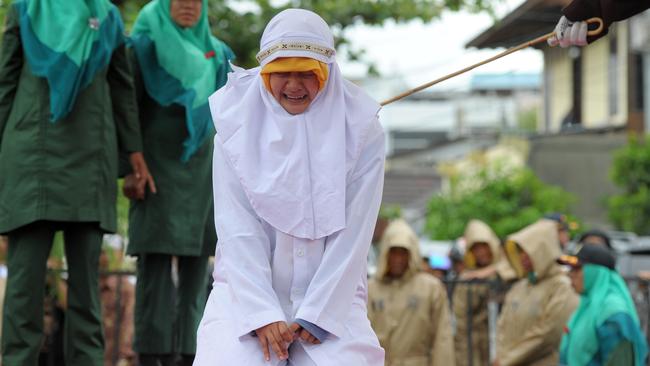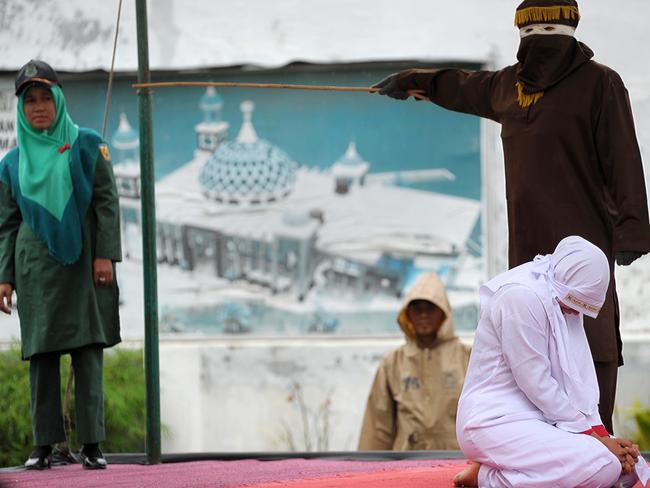Unmarried sex is punishable by public caning in Aceh, Indonesia
ONE of Australia’s closest neighbours has seen a surge in public canings for sex outside of marriage, despite human rights groups branding it ‘inhumane’.

THERE has been a surge in Indonesians punished by caning for engaging in sexual acts out of wedlock and homosexuality since a law adopted by Indonesia’s sharia-ruled province of Aceh was introduced two years ago.
The 2014 bylaw, known as qanun jinaya, introduced as criminal offences; consensual intimacy or sexual activity for unmarried couples; consensual sex outside marriage and same-sex sexual relations.
The law allows for up to 200 lashes in public as a punishment and has been heavily enforced since it was introduced. Aceh has gained international infamy for its strict Islamic laws.
Amnesty International said more than 114 people were caned in public last year for offences including selling alcohol, gambling, and sex outside marriage. The human rights group said this was a substantial increase from previous years, although there is no official tally of those caned for breaching the province’s sharia law.
On October 17 this year, seven men and six women were caned between nine and 25 times at Al Ikhlas Mosque in Gampong Keuramat village, Aceh for being alone with someone of the opposite sex who is not a marriage partner or relative (khalwat), and committing sexual intimacy outside marriage (ikhtilath).
A pregnant woman who was sentenced to caning will not receive her punishment until after she has given birth to her child. Humanitarian organisations have urged authorities in Aceh to quash her conviction and sentence immediately.

In December last year, a woman was viciously caned in public as a punishment for being in “proximity” to a man who wasn’t her spouse.
The 20-year-old Acehnese woman, Nur Elita, was said to commit the offence of “kwalwat” — talking or being in “proximity” to a man other than her husband or relative — under the Islamic sharia law in Banda Aceh, Indonesia on December 28.

Aceh is the only province of Indonesia that enforces the Islamic sharia law which sees offenders punished by public caning. Canings in Aceh are always carried out in public, drawing large crowds and media attention, according to Amnesty International.
Amnesty International and the Institute for Criminal Justice Reform (ICJR) today called on the Indonesian authorities to adhere to international human rights obligations and end the use of caning as a form of punishment, as well as repeal the provisions of the Aceh Islamic Criminal Code that violate international law.
“Caning contravenes Indonesia’s Constitution and is in clear violation of international human rights law and standards. It constitutes a cruel, inhumane and degrading punishment and can amount to torture,” a joint statement read.
“(It’s) in violation of the UN Convention against Torture and other Cruel, Inhuman or Degrading Treatment or Punishment (UNCAT), and the International Covenant on Civil and Political Rights (ICCPR), to which Indonesia is a State Party.
“Consensual sexual relationships must not be treated as a criminal offence, nor are they a crime against ‘morality’.”
“Amnesty International and ICJR are also concerned with the authorities’ overemphasis on enacting punishments and making a ‘moral’ example of offenders through public caning.”
The UN Human Rights Committee and other expert human rights bodies have previously raised concerns about laws criminalising ‘adultery’ or other consensual sexual relations outside marriage.




